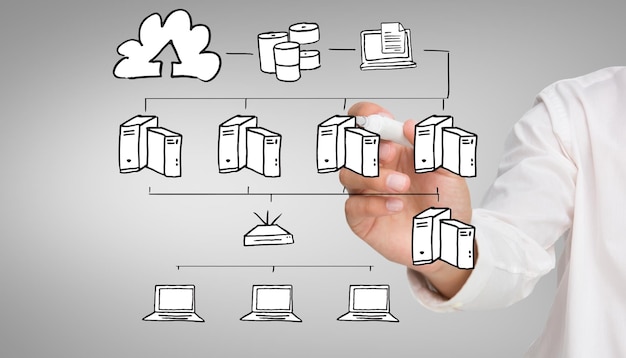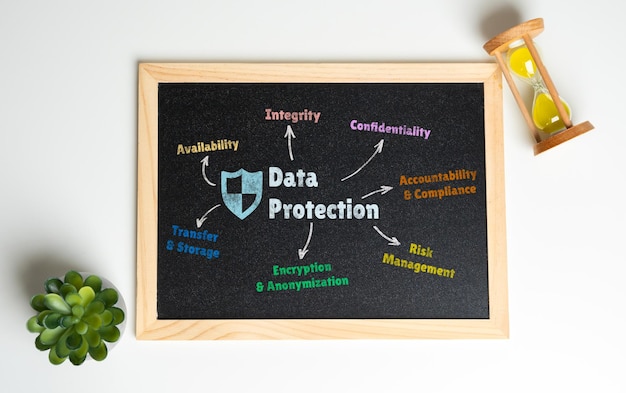New Federal Data Privacy Regulations: Business Guide for 2026

New federal regulations on data privacy, set to take effect before January 1, 2026, necessitate businesses to proactively understand and comply with evolving standards to protect consumer data and avoid severe penalties.
The landscape of data privacy is undergoing a significant transformation. New federal regulations on data privacy are on the horizon, and businesses must prepare for the changes taking effect before January 1, 2026.
Understanding the Impetus Behind New Data Privacy Regulations
The surge in data breaches and growing consumer awareness have fueled the demand for robust data privacy regulations. These regulations aim to empower individuals with greater control over their personal information and ensure businesses handle data responsibly.
Several factors have contributed to the need for enhanced data protection measures. Let’s delve into the key drivers that shape the new regulations:
Rising Concerns Over Data Breaches
The proliferation of cyberattacks and data breaches has exposed vulnerabilities in existing data protection frameworks. Consumers are increasingly concerned about the security of their personal information and the potential for identity theft.
Demand for Greater Transparency
Consumers are demanding greater transparency from businesses regarding the collection, use, and sharing of their data. They want to know what information is being collected, how it is being used, and with whom it is being shared.
- Increased consumer awareness of data privacy rights.
- Growing demand for control over personal data.
- Need for businesses to be more transparent about data practices.
New data privacy regulations are designed to address these concerns by establishing clear guidelines for data processing and ensuring accountability for data breaches.

These regulations are not just about legal compliance; they’re about building trust with your customers. By prioritizing data privacy, businesses can strengthen their reputation and foster long-term relationships.
Key Provisions of the Upcoming Federal Data Privacy Regulations
The upcoming federal data privacy regulations encompass various provisions designed to safeguard personal information. Let’s examine some of the key elements businesses need to understand.
These provisions will have a significant impact on how businesses collect, use, and share personal data. Here are some critical aspects to consider:
Data Minimization and Purpose Limitation
The regulations emphasize data minimization, which means businesses should only collect the data necessary for specified purposes. Purpose limitation restricts the use of data to those originally defined purposes.
Data Security and Breach Notification
Businesses will be required to implement robust security measures to protect personal data from unauthorized access, use, or disclosure. They must also establish procedures for notifying individuals and regulators in the event of a data breach.
- Right to access and correct personal data.
- Right to delete personal data under certain circumstances.
- Right to opt out of the sale of personal data.
Compliance with these provisions requires careful planning and implementation. Businesses should conduct thorough risk assessments and develop comprehensive data privacy policies to ensure they meet the regulatory requirements.
Understanding and adhering to these key provisions is crucial for businesses to maintain compliance and protect the privacy of their customers’ data.

How the Regulations Broadly Define Personal Data
Understanding what constitutes personal data is vital for businesses to comply with data privacy regulations. The definition extends beyond obvious identifiers like names and addresses, encompassing a wide range of information that can identify an individual.
The definition of personal data is broad and includes any information that can be used to identify an individual. Let’s break down the key categories:
Direct Identifiers
These are pieces of information that directly identify an individual, such as their name, social security number, or passport number.
Indirect Identifiers
These are pieces of information that, when combined with other data, can be used to identify an individual. Examples include demographic information, location data, and online browsing history.
- IP addresses and device identifiers.
- Cookies and tracking technologies.
- Biometric data, such as facial recognition data.
Businesses should carefully review their data collection practices to identify all types of personal data they collect and ensure they have appropriate safeguards in place to protect this information.
By understanding the breadth of the definition of personal data, businesses can better protect individuals’ privacy and prevent data breaches.
Practical Steps for Businesses to Achieve Compliance
Complying with the new federal data privacy regulations requires a proactive and strategic approach. Businesses should take concrete steps to assess their current practices, implement necessary changes, and ensure ongoing compliance.
Here are some practical steps businesses can take to prepare for the new regulations:
Conduct a Data Audit
Identify all types of personal data collected, how it is used, and where it is stored. This will help you understand the scope of your compliance obligations.
Update Your Privacy Policies
Ensure your privacy policies are clear, transparent, and compliant with the new regulations. Communicate these policies effectively to your customers.
- Implement strong security measures to protect personal data.
- Provide employees with training on data privacy best practices.
- Establish a process for responding to data subject requests.
Achieving compliance is an ongoing process that requires continuous monitoring and adaptation. Businesses should stay informed about changes in the regulatory landscape and update their practices accordingly.
Taking these practical steps will enable businesses to navigate the complexities of the new regulations and build a culture of data privacy.
The Role of Data Protection Officers (DPOs)
Data Protection Officers (DPOs) play a crucial role in helping businesses comply with data privacy regulations. These professionals are responsible for overseeing data protection strategies and ensuring compliance with applicable laws.
Having a DPO can be a significant asset for businesses navigating the complexities of data privacy. Here’s what they do:
Expertise in Data Privacy Laws
DPOs possess in-depth knowledge of data privacy laws and regulations, enabling them to provide expert guidance on compliance requirements.
Monitoring Compliance
DPOs monitor data processing activities to ensure they comply with privacy policies and legal obligations.
- Serving as a point of contact for data subjects and regulators.
- Providing training and awareness programs for employees.
- Conducting data protection impact assessments (DPIAs).
Whether you hire a dedicated DPO or assign responsibilities to an existing employee, having someone dedicated to data protection is essential for maintaining compliance.
A DPO can help businesses build a strong data protection culture and mitigate the risk of non-compliance.
Potential Penalties for Non-Compliance
Failure to comply with data privacy regulations can result in significant penalties, including fines, legal action, and reputational damage. Businesses should take compliance seriously to avoid these consequences.
The penalties for non-compliance can be substantial. Here’s what you need to know:
Financial Penalties
Regulators can impose hefty fines for violations of data privacy laws. The amount of the fine may depend on the severity of the violation and the size of the business.
Legal Action
Individuals who have been harmed by data breaches or privacy violations may file lawsuits against businesses, seeking compensation for damages.
- Loss of customer trust and brand reputation.
- Disruption of business operations.
- Increased scrutiny from regulators.
Investing in compliance is a smart business decision that can help you avoid costly penalties and maintain a positive reputation.
Understanding the potential penalties can motivate businesses to prioritize data privacy and ensure they meet their legal obligations.
| Key Point | Brief Description |
|---|---|
| 🛡️ Data Minimization | Collect only necessary data for specified purposes. |
| 🚨 Breach Notification | Establish procedures for notifying individuals and regulators. |
| 🔑 Data Protection Officer | Oversee data protection strategies and ensure compliance. |
| 💰 Penalties for Non-Compliance | Fines, legal action, and reputational damage. |
Frequently Asked Questions (FAQ)
▼
The new regulations introduce stricter requirements for data collection, use, and sharing, emphasizing transparency, data minimization, and enhanced security measures to protect personal information.
▼
The definition is broadened to include any information that can directly or indirectly identify an individual, including IP addresses, location data, and online browsing history.
▼
Businesses should conduct a data audit, update privacy policies, implement robust security measures, train employees, and establish a process for responding to data subject requests.
▼
A DPO oversees data protection strategies, ensures compliance with applicable laws, serves as a point of contact for data subjects and regulators, and conducts data protection impact assessments.
▼
Non-compliance can result in significant financial penalties, legal action from affected individuals, loss of customer trust, and increased scrutiny from regulatory bodies overseeing data privacy.
Conclusion
As January 1, 2026 approaches, businesses must prioritize understanding and complying with these new federal regulations on data privacy. Proactive preparation, including data audits, policy updates, and employee training, is essential to mitigating risks and safeguarding consumer data.
